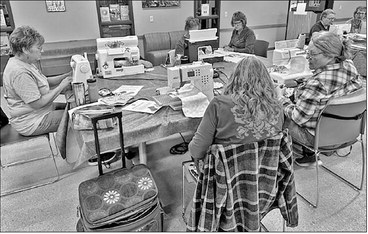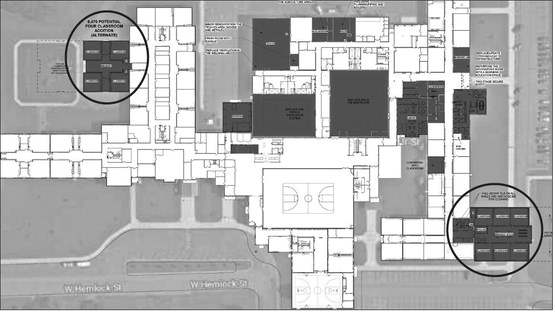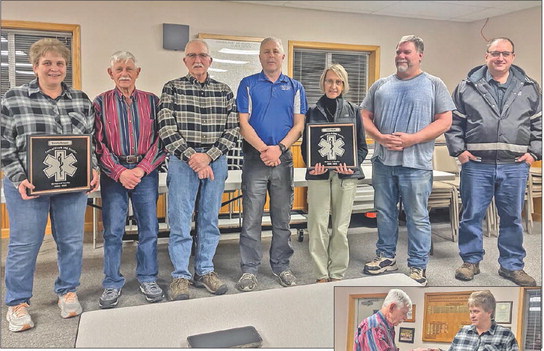Clark County recommends to make revisions of state wind energy rules
The Tribune Record Gleaner The Clark County Board of Supervisors has taken a formal step to recommend that the state Public Service Commission (PSC) revise its wind energy regulations. At its January meeting, the board passed Resolution 3-1-23 titled, “Recommending Revision to State Wind Energy Regulations,” a copy of which will be sent to the State Legislature.
State statutes as well as PSC rules limit to what extent counties can regulate solar and wind energy systems. The county passed its renewable energy system ordinance in May; however, the ordinance is not any more restrictive than what is already found in state statute. Counties do not have constitutional home rule authority, meaning they cannot take any action unless it is specifically allowed by state statute. Therefore, the county is requesting that the state grant it more power to regulate solar and wind energy systems in the county.
Resolution 3-1-23 recommends the PSC and the Wisconsin State Legislature revise Wisconsin Administrative Chapter PSC 128 and/or Wis Stat. Chapter 66 to address the following four concerns, as quoted from the resolution.
1. “Some renewable energy contracts under the current regulations appear to bind owners and their property to decades’ worth of encumbrances while allowing renewable energy companies to terminate the contracts at any time for any or no reason.”
2. “The law does not prohibit energy companies from shifting liability created by the renewable energy company to the landowners. This includes liability for stray voltage, diminished property values, neurological problems, cancer and death that the renewable energy companies cause.”
3. “State law prohibits the regulation of the density and footprint of renewable energy systems by municipalities, and prohibits Clark County from requiring bonding certain to ensure proper decommissioning of renewable energy systems.”
4. “Clark County has concerns about the use of renewable energy systems and their impact on agricultural land and production, at a time when war abroad disrupts food chains and causes food shortages, and as domestically we are experiencing uncontrolled inflation.”
The planning, zoning and land information committee submitted these concerns in the form of a resolution, so the county board could approve it and pass it on to the state, with the ultimate goal of gaining more regulatory authority over wind farms as a county.
This issue has come up a number of times at the county level, starting in 2017 when a company known as EDP Renewables showed interest in developing a wind farm with about 30 turbines in the town of Loyal. That plan was abandoned in 2018; however, over the last two years, RWE Renewables has been pursuing a wind turbine project in northeastern Clark County. RWE started in Germany in 1898 as Rheinisch- Westfälisches Elektrizitätswerk. The fourth-largest renewable energy company in the world, RWE generates and trades electricity in Asia, Europe and the United States. It’s been in the U.S. since 2006 and has 30 wind farms here, with 3,000 turbines.
RWE’s Clark County project includes the towns of Hoard, Mayville and Green Grove. RWE approached the Mayville town board back in October 2020 and has been contacting individual landowners to sign contracts since then.
According to RWE Renewables outreach manager Julie Drennen, the proposed project would produce about 200 megawatts of energy from 40 to 50 wind turbines spread out over 20,000 to 25,000 acres of land. There will be three or four turbines for each section of land. Around 50 to 60 landowners have signed easements to participate in the project, and more than 12,000 acres have been committed. As of Jan. 19, RWE developer Shane Felske planned to open an RWE office in Abbotsford.
Drennen and another representative from RWE Renewables attended the county board meeting and asked the county to reconsider some of the wording of its resolution.
“What this wording suggests to us is there are some concerns, and we’re concerned about that, with wind energy and wind turbines. So we would like to address some of those,” said Drennen. “When it comes to health, the research is completely crystal clear in that there is no direct health impact from wind turbines. Multiple agencies have show this. Doctors have shown this. There is no direct health impact.”
While not specifically referenced in the resolution, Drennen also addressed the issue of noise created by the turbines.
“They do produce sound. We’re not going to deny that. There is sound there. It’s at the level that’s typically less than a household appliance from the distance it is from the home; it’s just that the sound doesn’t have any health impacts.”
RWE has previously stated that each turbine would be at least 1,250 feet away from any residence and the distance away from the road would be equal to 110 percent of the turbine’s height.
Drennen also addressed concerns about the process of decommissioning the towers, and who would take care of that.
“It is required by the PSC that we decommission and that we completely remove all above-ground infrastructure and everything up to 4 feet below ground as well... If there’s concern about the PSC, it is common practice ourselves to remove that infrastructure and it’s in our lease agreement as well. It’s something we care about and we take that lease agreement very seriously,” she said. However, she said that typically at the end of the turbine’s life, which is about 30 years, RWE will offer the opportunity for the landowner to re-sign. Although none of RWE’s turbines have reached that age yet, since the company’s only been in the U.S. since 2006, other renewable energy companies’ turbines have reached that stage and they are finding ways to con- tinue using them.
“That’s now common practice. We (as an industry) are doing that now. Some of the earlier wind farms in Texas, we are fully taking basically the cell off the top, which is the generator, adding a new cell and blades and establishing another length of time to operate that wind farm. And you’ll see that across the country here as the years come on,” said Jason Dagger, director for RWE Renewables.
Drennen also addressed the issue of stray voltage from underground cables.
“That is something the industry has grown and improved on a lot. It is a concern that we take very seriously. Again, the PSC does regulate that. They make sure that before anything is built, that we can assure that there is no stray voltage. So they test collection lines and all that, and they run checks on that. So that’s something that’s extremely regulated and we’ve seen vast improvement in that,” she said. “There are many dairy farms and feed operations that occur alongside wind farms, and stray voltage has not been a problem for the vast majority of those.”
The last issue Drennen touched on was land use and food security.
“All the acreage that I mentioned, over 99 percent of that is in agricultural production,” said Drennen.
She said farmers would be able to farm right up to the base of the turbine. The turbine itself and the access road take up about one-third to twothirds of an acre, typically. The farmer has the ability to use the access road for their own farming operations. The wind turbine serves as an additional source of income for the farmer while keeping the majority of the land for agricultural production.
Although the RWE representatives did their best to allay citizens’ concerns about wind power, their answers were not convincing enough for the board to amend its resolution. However, county board chairperson Wayne Hendrickson expressed skepticism that the resolution would have any effect on state policy, anyway.
“This is like any other thing we send down to our legislators because we want something changed. We might as well save ourselves a stamp because they’re just going to throw it away,” said Hendrickson. “I disagree. We need to explore how unfair this contract is... This should be taken to our surrounding counties and create a coalition. I mean, for the most part you’re right, Wayne, if it only goes this far, but it needs to go further because this a very one-sided, unfair contract,” said Fred Schindler, county supervisor for District 3, which includes the village of Curtiss and parts of the towns of Mayville and Hoard where the wind turbines would go up. Schindler yielded the floor to his friend Martin Machtan, an attorney in Marshfield. Machtan spoke in favor of the resolution and said that if anything, it wasn’t worded strongly enough. He pushed back on some of Drennen’s claims.
“In terms of the assurances from RWE that ‘Oh, well this is very well regulated’ — well, I feel that these regulations were written by the industry... I read all of PSC 128 and there are provisions for limited stray voltage and testing for stray voltage. But as far as I can see, there is no compensation to a farmer whose herd has produced less because of stray voltage,” said Machtan.
He said that in this area, most people’s greatest asset was tillable land.
“This land is everything and the easements so encumber land. And it means two things: it generally makes land worse when the land is encumbered, and it makes it harder to sell,” he said. “You’re basically partnering with people you don’t know very well who can easily sell a project.”
He was concerned that the easement farmers sign with RWE did not provide enough protection to the farmer.
“Back to PSC 128, every renewable energy contract I’ve had, looks like the renewable energy company takes responsibility for the problems they cause. And the example I have from RWE, they may have a different contract now... But in the last contract I saw from RWE, after saying ‘We take responsibility for everything,’ in 10.4(b) it says that ‘The owner acknowledges that there may be risks and nuisances associated with electrical energy generation, and owner knowingly waives all claims related to such risks.’ So they say they’re taking responsibility, but later in the contract they say, ‘No, landowner. No, farmer. The responsibility is yours.’” He also questioned whether RWE was trying to get around the regulations already set forth in administrative code, as PSC code provides some legal protection for the landowner.
PSC 128.11(2) states that “A wind energy system lease (emphasis added)... shall hold harmless and indemnify the real property owner for ... any damages or bodily injury caused by the construction, operation or decommissioning of the wind energy system,” thus indicating that the renewable energy company would be held responsible in the event that the wind energy system caused the farmer bodily harm or property damage.
However, Machtan said that every document he had seen from RWE had referred to the agreement between RWE and the farmer as an easement, not a lease. He questioned if the RWE lawyers had intentionally called the agreement an easement instead of a lease, so that RWE would not be held liable under PSC code.
“Is this an intentional way to shift the burden and the liability from a multi-billion dollar, multinational corporation to our neighbors and friends? And they’re not alone in this. I’ve seen this with solar companies; I’ve seen it with every wind company I’ve dealt with. But it just feels insincere and fundamentally dishonest,” said Machtan.
He also spoke on concerns over negative health effects.
“Whenever I see a study that shows there’s no diminished property values or there’s no adverse health effects from wind farms, you always have to look at who funds the study and it always seems that the renewable energy companies fund these studies. I don’t know how you’re going to say that your property is worth as much or more if you have towers hundreds of feet away making noise and blinking. I do know that neurological conditions have been attributed to the shadow flicker from wind turbines.”
He urged landowners considering partnering with RWE to be cautious, think critically about the possible repercussions and make sure they had competent legal counsel.
“I’ve never seen an easement or a lease that takes more rights than these,” he finished.
Dagger said that he appreciated Martin’s comments and that RWE encouraged all of their landowners to take the agreement to an attorney.
“We want the attorney to have a discus- sion with the landowner, and we actually pay for that. We reimburse the landowner to use their own attorney... This is a contract between the landowner and us, the company that’s trying to provide a financial benefit to the landowner,” said Dagger.
“There is a lot in that agreement. It’s 50-some pages. There’s a lot of things in there, no question. I think there are some changes that we can make to it that we can work out with the landowner. But I think these agreements are fundamental for business. They’re typical business agreements. I don’t think they’re uncharacteristic of most partnerships that you would find in the business world,” Dagger finished.
“I disagree,” said Machtan. The resolution passed 26-2, with Arlene Kodl and Roy Tyznik voting against it.




